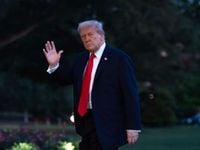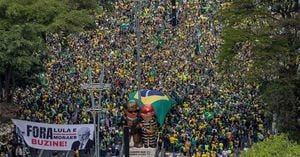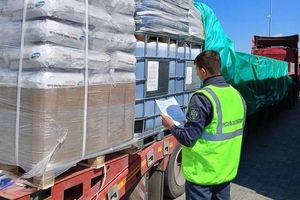The ongoing war in Ukraine continues to send shockwaves across the globe, with recent developments highlighting both the intensity of the conflict and the complex web of international interests at play. Over the past week, Russia launched its largest-ever aerial assault on Ukraine, killing at least four people, including an infant, and setting fire to the government complex housing Ukraine’s cabinet, as reported by the Ukrainian Air Force and covered by multiple international outlets. The barrage, consisting of at least 810 drones and 13 missiles, marked a grim milestone in a war now stretching into its fourth year, with no clear end in sight.
Amid the carnage, U.S. President Donald Trump voiced his frustration, telling reporters at Joint Base Andrews, “It’s such a horrible waste of humanity. I am not thrilled with what’s happening there, I will tell you. I think it’s going to get settled.” Trump’s remarks, quoted by NBC News, came as his administration floated the possibility of imposing even tougher sanctions on Moscow, with the stated aim of “collapsing” the Russian economy and forcing President Vladimir Putin to the negotiating table.
U.S. Treasury Secretary Scott Bessent underscored this approach, stating, “We are prepared to increase pressure on Russia, but we need our European partners to follow us. We are in a race now between how long can the Ukrainian military hold up versus how long can the Russian economy hold up.” Bessent argued that secondary sanctions targeting countries that continue to buy Russian oil—such as India and China—could cripple Russia’s war machine, adding, “If the US and the EU can come in, do more sanctions, secondary tariffs on the countries that buy Russian oil, the Russian economy will be in full collapse.”
However, as The Wall Street Journal analysis pointed out, the lack of a coordinated U.S.-European strategy on Ukraine plays to Russia’s advantage. Despite mounting sanctions, Russia’s economy showed steady growth through 2023 and 2024, with no immediate signs of crisis. Alexander Gabuev, director of the Carnegie Russia Eurasia Center in Berlin, told WSJ that Russia’s economy could sustain the war effort for another 18 to 24 months before facing serious difficulties—unless the West strengthens sanctions enforcement or oil prices decline significantly. Yet, cutting off Russia’s oil revenues entirely remains a tall order. Moscow continues to supply oil to China and India, and U.S. secondary sanctions have so far failed to dissuade New Delhi from purchasing Russian energy resources. Meanwhile, neither Washington nor Europe has imposed harsh measures on Beijing for its economic support of Russia, perhaps wary of sparking a broader trade war with China, which is well-positioned to retaliate.
Putin, for his part, has worked diligently to shield much of Russian society from the economic and mobilization impacts of the war. Maria Snegovaya, a Russia expert at the Center for Strategic and International Studies, observed, “Putin isn’t totally insensitive to economic fallout—such as inflation—that could cause widespread discontent. The proof is that Putin has tried hard to insulate much of Russian society from the war, in both his economic and mobilization policies.”
On the Ukrainian side, the situation is no less fraught. The country’s armed forces are grappling with a growing shortage of personnel, a challenge Kyiv is attempting to offset through increased use of drone technologies. However, as noted in the WSJ report, unmanned aerial vehicles are no substitute for boots on the ground. Furthermore, “rigid Soviet-style habits of Ukraine’s military command, which many soldiers say have caused unnecessary losses, have also eroded trust in the army leadership as well as citizens’ willingness to sign up,” the article states. Many front-line officers and military analysts have urged the government to overhaul the management of its armed forces to better meet the demands of modern warfare.
Diplomatic efforts have been equally turbulent. Trump, who has long promised a swift end to the war, admitted at a recent White House dinner that he underestimated the difficulty of brokering peace. “Nobody has done what we did in seven months. We stopped seven wars. The war that I thought would probably be the easiest was the most difficult: that of Russia and Ukraine. I thought it would be easiest because of the relationship with President Putin... It didn’t matter. It ended up being probably the most difficult,” he said, as reported by The Independent. Trump’s optimism for a quick resolution has given way to a more somber realism, with sources close to him describing his outlook as increasingly pessimistic.
Russian President Vladimir Putin, meanwhile, has shown little appetite for compromise. He recently invited Ukrainian President Volodymyr Zelensky to Moscow for peace talks—a proposal Zelensky flatly rejected, telling NBC News, “He can come to Kyiv. If a person doesn’t want to meet during the war, of course, he can propose something which is acceptable to me or the other. It’s understandable; I can’t go to Moscow when my country’s under missiles, under attack, each day. I can’t go to the capital of this terrorist.” Zelensky accused Putin of “playing games” for Trump’s benefit, insisting that genuine negotiations cannot occur while Ukraine remains under assault.
The diplomatic chessboard has only grown more complicated with the involvement of other global powers. Trump has imposed a 50 percent tariff on India for its continued purchases of Russian oil, a move that has drawn sharp rebukes from New Delhi. Indian officials rejected accusations from Trump’s trade adviser Peter Navarro that India was acting as an “oil money laundromat for the Kremlin,” labeling such statements “wrong and misleading.” At the same time, European leaders have rallied to Ukraine’s side, with French President Emmanuel Macron announcing that 26 countries have agreed to provide military assistance to Ukraine on land, sea, and air.
Putin, undeterred by Western sanctions, has called for renewed efforts to develop Russia’s aerospace industry and booster rocket engines, boasting of his country’s resilience in the face of economic restrictions. “In conditions of restrictions from sanctions, we succeeded in a short period of time in developing a series of innovative engines for energy,” Putin declared, emphasizing that these advancements are being used in both the energy sector and gas transport infrastructure.
On the ground, the human toll continues to mount. Ukrainians in the eastern Donetsk region are being forced from their homes as Russian strikes intensify, with towns across the area steadily emptying. “We kept hoping. We waited for every round of negotiations. We thought somehow they would reach an agreement in our favor, and we could stay in our homes,” one displaced resident told The Independent.
As the war drags on, Ukraine’s allies are preparing a new round of sanctions in hopes of ramping up pressure on Putin. Canadian Prime Minister Mark Carney put it bluntly: “Mr Putin is the cause of this war. He’s the reason for the killing—he is not going to dictate the terms of the peace.”
The conflict in Ukraine remains a grim testament to the limits of diplomacy, the resilience of national economies under siege, and the far-reaching consequences of global alliances and rivalries. For now, peace remains elusive, and the world watches, hoping that reason—and humanity—might yet prevail.




